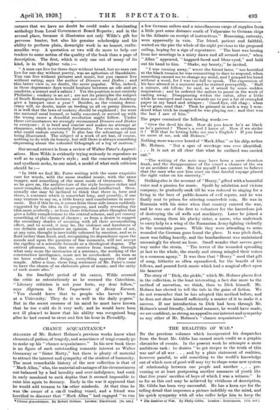CHANCE ACQUAINTANCE.*
ttEADERS of Mr. Robert Holmes's previous works know what elements of pathos, of tragedy, and sometimes of tragi-comedy go to make up his " chance acquaintance." In his new book there is no figure of such outstanding romantic interest as Walter Greenway or " Sister Matty," but there is plenty of material to attract the interest and sympathy of the student of humanity. The most remarkable history of the new collection is that of " Mark Allan," who, the material advantages of his circumstances out-balanced by a bad heredity and over-indulgence, had sunk in early manhood to such depths that it seemed impossible to raise him again to decency. Early in the war it appeared that he would add treason to his other misdeeds. At that time he was the owner of a small trading vessel, and a friend was horrified to discover that " Mark Allan " had engaged " to run • Chance Acquaintance. By Robert Holmes. London: Blackwood. [Bs. net.]
a few German sailors and a miscellaneous cargo of Supplies from a little port some distance south of Valparaiso to German ships in the Atlantic on receipt of instructions." Reasoning, entreaty, were apparently in vain. The friend, patient and faithful, waited on the pier the whole of the night previous to the proposed sailing, hoping for a sign of repentance. The boat was loosing from her moorings in a misty dawn and all seemed over," when " Allan " appeared, " haggard-faced and blear-eyed," and held out his hand to him. " Shake, my beauty," he invited.
" I was turning away," wrote the friend later, " too horrified at the black treason he was committing to dare to respond, when something caused me to change my mind, and I grasped his hand without a word, for I was too full to speak. The expression of his face altered in a moment and he started perceptibly. Half a minute, old fellow,' he said, as if seized by some sudden inspiration ; and he ordered the sailors to pause in the work of casting away. Disappearing within the cabin, after a little while he emerged and came towards me to put a bit of crumpled paper in my hand and whisper ; Good-bye, old chap ; when we've gone, read that.' Then he grinned in such a way I won- dered what trick he imagined he was playing me : and that was the last I saw of him."
The paper contained the following words :- " Give the devil his due. How do you know he's as black as he's painted ? There's a reef I know of. How if we strike it ? Will that be letting folks see one's English ? If you hear no more of me, ask old Holmes."
Nothing more was ever heard of " Mark Allan " or his ship, writes Mr. Holmes. " Not a spar of wreckage was ever identified.
. . . It is not at all clear that what he outlined was carried out."
" The writing of the note may have been a mere drunken freak, and the disappearance of the vessel a chance of the sea or an accident of war. But for myself I am content to believe that the man who saw him start on that fateful voyage placed the right value on his sincerity."
Striking also is the account of "Henry," gifted with a beautiful voice and a passion for music. Spoilt by adulation and vicious company, he gradually sank till he was reduced to singing for a living in the bars of public-houses of evil repute, and he was finally sent to prison for uttering counterfeit coin. He was in Rumania with his sister when that country entered the war, and he was one of the first to volunteer for the hazardous job of destroying the oil wells and machinery. Later he joined a party, among them his plucky sister, a nurse, who undertook to carry help to a wing of the Rumanian Army fighting violently in the mountain passes. While they were attending to some wounded the German guns found the place. It was pitch dark, snow was falling heavily, and the bombardment was maintained unceasingly for about an hour. Small wonder that nerves gave way under the strain. " The terror of the wounded spreading at last to the whole, the sturdy and strong mingled their voices in a common agony." It was then that " Henry " used that gift of song, hitherto so often squandered, for the benefit of his fellows, and poured forth music which had a magical effect upon his hearers'
The story of " Dick, the pickle," which Mr. Holmes places first in the collection, is the least interesting, a fact due more to the method of narration, we think, than to Dick himself. Mr. Holmes has elected to tell the tale in the guise of fiction. We do not remember that he has adopted this method before, and he does not show himself sufficiently a master of it to make it a success. If our introduction to Dick had been through Mr. Holmes's usual friendly, informal manner, he would have made, we are confident, as strong an appeal to our interest and sympathy as any other of Mr. Holmes's " chance acquaintance."


































 Previous page
Previous page